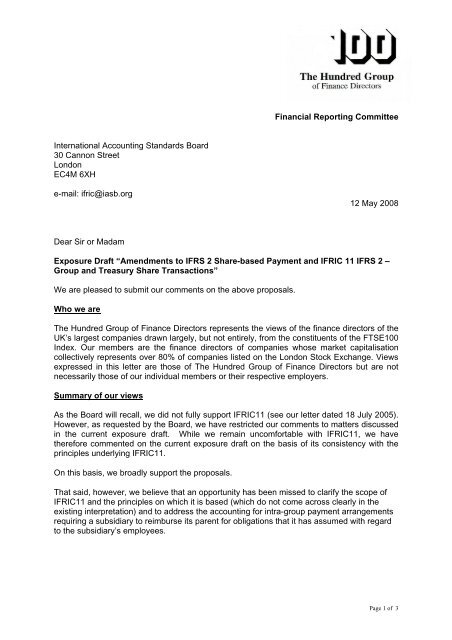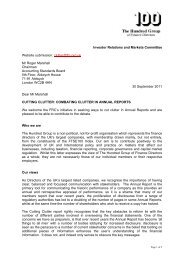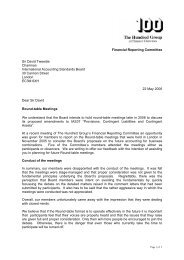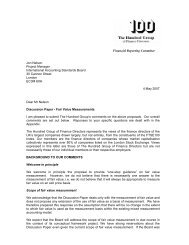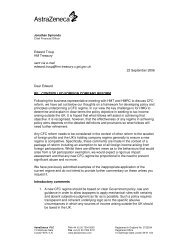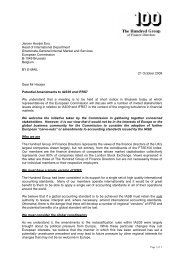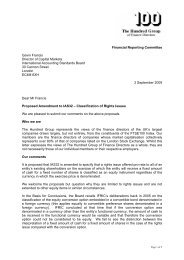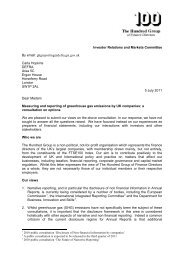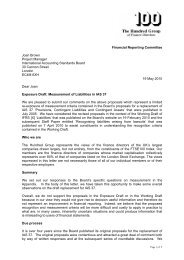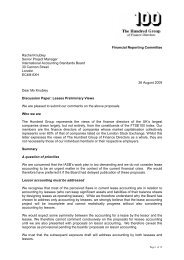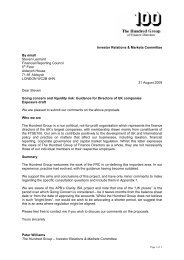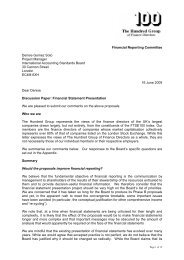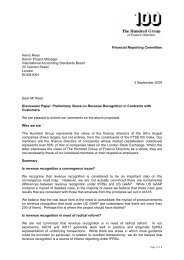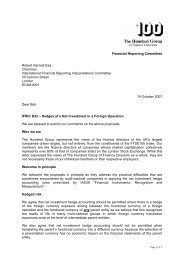Financial Reporting Committee International Accounting Standards ...
Financial Reporting Committee International Accounting Standards ...
Financial Reporting Committee International Accounting Standards ...
You also want an ePaper? Increase the reach of your titles
YUMPU automatically turns print PDFs into web optimized ePapers that Google loves.
<strong>International</strong> <strong>Accounting</strong> <strong>Standards</strong> Board<br />
30 Cannon Street<br />
London<br />
EC4M 6XH<br />
e-mail: ifric@iasb.org<br />
Dear Sir or Madam<br />
<strong>Financial</strong> <strong>Reporting</strong> <strong>Committee</strong><br />
12 May 2008<br />
Exposure Draft “Amendments to IFRS 2 Share-based Payment and IFRIC 11 IFRS 2 –<br />
Group and Treasury Share Transactions”<br />
We are pleased to submit our comments on the above proposals.<br />
Who we are<br />
The Hundred Group of Finance Directors represents the views of the finance directors of the<br />
UK’s largest companies drawn largely, but not entirely, from the constituents of the FTSE100<br />
Index. Our members are the finance directors of companies whose market capitalisation<br />
collectively represents over 80% of companies listed on the London Stock Exchange. Views<br />
expressed in this letter are those of The Hundred Group of Finance Directors but are not<br />
necessarily those of our individual members or their respective employers.<br />
Summary of our views<br />
As the Board will recall, we did not fully support IFRIC11 (see our letter dated 18 July 2005).<br />
However, as requested by the Board, we have restricted our comments to matters discussed<br />
in the current exposure draft. While we remain uncomfortable with IFRIC11, we have<br />
therefore commented on the current exposure draft on the basis of its consistency with the<br />
principles underlying IFRIC11.<br />
On this basis, we broadly support the proposals.<br />
That said, however, we believe that an opportunity has been missed to clarify the scope of<br />
IFRIC11 and the principles on which it is based (which do not come across clearly in the<br />
existing interpretation) and to address the accounting for intra-group payment arrangements<br />
requiring a subsidiary to reimburse its parent for obligations that it has assumed with regard<br />
to the subsidiary’s employees.<br />
Page 1 of 3
Responses to specific questions<br />
Question 1<br />
Specifying how a subsidiary that receives goods or services from its suppliers<br />
(including employees) should account for cash-settled share-based payment<br />
arrangements described in new paragraph 3A of IFRIC 11<br />
The proposed amendments specify that:<br />
a) in the financial statements of a subsidiary that receives goods or services from<br />
its suppliers under the arrangements described in new paragraph 3A of<br />
IFRIC11, the subsidiary should apply IFRS2 to account for the transactions with<br />
its suppliers. In other words, in the financial statements of the subsidiary, such<br />
cash-settled share-based payments are within the scope of IFRS2 (see new<br />
paragraph 3A of IFRS2 and new paragraph 11A of IFRIC11).<br />
Do you agree with the proposal? If not, why?<br />
We agree that the arrangements described in new paragraph 3A of IFRIC 11 should fall<br />
within the scope of IFRS2.<br />
We suggest that the proposals should be re-drafted to make it clear (as we expect is the<br />
Board’s intention) that situations in which a subsidiary incurs a liability to make cash<br />
payments to its employees based on the price of the equity instruments of its parent are also<br />
within the scope of IFRS2.<br />
We also suggest that IFRIC 11 should be re-worded to make it clear that its principles apply<br />
to arrangements in which the parent or another group entity enters into share-based payment<br />
transactions with the employees of a subsidiary or in which a subsidiary enters into sharebased<br />
payment transactions involving or that are linked to the price of the equity instruments<br />
of the parent or another group entity.<br />
b) the subsidiary should measure the goods or services received from its<br />
suppliers in accordance with the requirements applicable to cash-settled sharebased<br />
payment transaction, as set out in IFRS2 (see new paragraph 11B of<br />
IFRIC11)<br />
Do you agree with the proposal? If not, why?<br />
Where a parent grants rights to its equity instruments to the employees of its subsidiary, the<br />
equity instruments granted are not the equity instruments of the subsidiary and the subsidiary<br />
has no obligation to transfer cash or other assets to the employees. In this scenario, IFRIC<br />
considered that the equity-settled basis of accounting in the subsidiary was more consistent<br />
with the principles of IFRS2 than the cash-settled basis (because the parent would account<br />
for the awards on an equity-settled basis).<br />
Where a parent incurs an obligation to make cash payments to the employees of a<br />
subsidiary based on the price of its equity instruments or the equity instruments of the<br />
subsidiary, the subsidiary similarly has no obligation to transfer cash or other assets to the<br />
employees. We therefore support the proposal on the basis that in this scenario the cashsettled<br />
basis of accounting in the subsidiary is more consistent with the principles of IFRS2<br />
than the equity-settled basis (because the parent would account for the awards on a cashsettled<br />
basis).<br />
Page 2 of 3
While it does seem a little odd at first glance to reflect the compensation expense in relation<br />
to a cash-settled share-based payment arrangement as a capital contribution, we concur with<br />
the proposal because it is consistent with the equity-settled scenario (because in each case<br />
the parent is incurring a liability in relation to services provided to the subsidiary which would<br />
otherwise have been incurred by the subsidiary).<br />
We would expect that in situations in which a subsidiary incurs a liability to make cash<br />
payments to its employees based on the price of the equity instruments of its parent it would<br />
be consistent with the principles of IFRS2 if the subsidiary were required to account for the<br />
awards on a cash-settled basis (because it would account for the awards on this basis if they<br />
were linked to the price of its own equity instruments).<br />
Question 2<br />
The proposed amendments to IFRS 2 and IFRIC 11 would be required to be applied<br />
retrospectively, subject to the transitional provisions of IFRS 2.<br />
Do you agree with the proposal? If not, what do you propose and why?<br />
We agree with the proposed retrospective application of the amendments subject to the<br />
transitional provisions of IFRS2. However, we suggest that it would be helpful if the Board<br />
was to re-iterate in IFRIC11 that the transitional provisions that apply to equity-settled<br />
transactions differ from those that apply to cash-settled transactions and clarify which<br />
transitional provisions apply in each situation.<br />
Please feel free to contact me if you would like to discuss our comments.<br />
Yours sincerely<br />
Mark Smith<br />
Secretary<br />
Hundred Group - <strong>Financial</strong> <strong>Reporting</strong> <strong>Committee</strong><br />
T: +44(0) 20 8877 5191<br />
E: msmith@tomkins.co.uk<br />
Page 3 of 3


